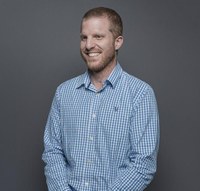Could you tell us a little bit about the beginning of LITHME?
“In 2016 I was sitting in an international research meeting about language policy, when it occurred to me that a lot of the things we were discussing would suddenly feel pretty outdated when a new generation of intelligent devices and services became widespread. I tried to gather my thoughts into a little essay, which was published the following year. That gradually turned into a conversation with others in different areas of linguistics, and we worked together to develop the proposal for LITHME. After we submitted the proposal we had no idea what the reaction would be, but we were delighted to receive the maximum possible score of 50/50! It was all down to finding the right team of people to sharpen up our ideas together. Most of them are still involved in LITHME today, which is great to see.”
The next major achievement for LITHME was the writing of LITHME’s first forecast report led by Sayers. That report has been downloaded thousands of times and gained a good number of academic citations, which Sayers finds really pleasing. He is currently busy co-organising a bigger book to gather insights from LITHME’s eight Working Groups. He is delighted to say that this book has just been signed to MIT Press, meaning it will be open access just like the report. It’s really exciting news!
Is it important to have something like LITHME in the research space?
According to Sayers, LITHME has an important place in the research community. LITHME is funded by the COST Association, and they focus all their funding on creating networks for new areas of research. “LITHME is not exactly a research project and we’re not collecting new data, testing out new methods and so on. The main goal of LITHME is just bringing together lots of people from related areas of research, and thinking about how on earth we’re going to research this totally new phenomenon. It’s the same for any COST network, and it’s a wonderful resource.” Sayers underlines that without this research space, the field of linguistics would be getting to grips with future language technologies in a much slower and more fragmented way (as happened in past decades with mass media and then the internet). He goes on to say, “it’s a fantastic opportunity to get everyone around the table to think through what lies ahead.”
Sayers highlights the importance of COST and its uniqueness as a funding programme. He remarks that COST has led to lots of successful new ideas for innovative research projects. LITHME has had a hand in these projects as well, because lots of these have emerged from people meeting each other through LITHME.
When it comes to the future of LITHME, there are plans for developing ethical guidelines for creation of new language technologies, focusing on issues like accessibility and privacy, to mention a few examples. LITHME has a long list of industry stakeholders that have been involved in its activities, with more to come in future. “COST is all about changing things and getting people to think in new ways. That’s one of the things that makes it so rewarding”, Sayers enthuses.
Another unusual thing about COST funding is that LITHME is equipped to bring in new members all the way to the end of the funding period in October 2024. “Our meetings and activities are always so abuzz with energy and new ideas, we would enthusiastically welcome anyone with any interest in the possible influences of future language technologies. But, as they say, don’t take my word for it! The feedback for our training school last year, for example, averaged 8/10. A good recommendation for getting involved!” Sayers illustrates.
About Dave Sayers:
“I grew up in the UK, and did my PhD there. I had academic jobs in the UK and Finland after that. I’ve been living in Finland now for a total of about six years. They say Finland is the happiest country in the world, and I’m certainly happy here!”
“In my research I’ve mostly focused on language policy. I’ve also always read a lot of tech news — not because I know much about tech! I just always found it interesting. But that does give you a certain eye towards the future.”

Become a member of the LITHME network
All LITHME’s activities are fully funded so there is nothing to lose. Anyone interested can start here and then contact our Working Groups to find out about what’s going on and how to get involved.

